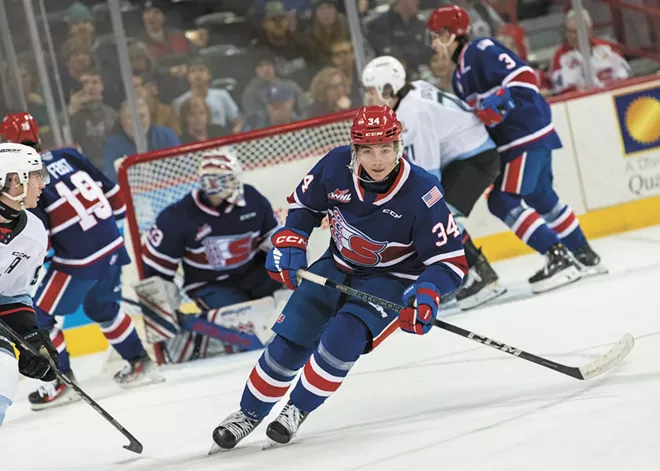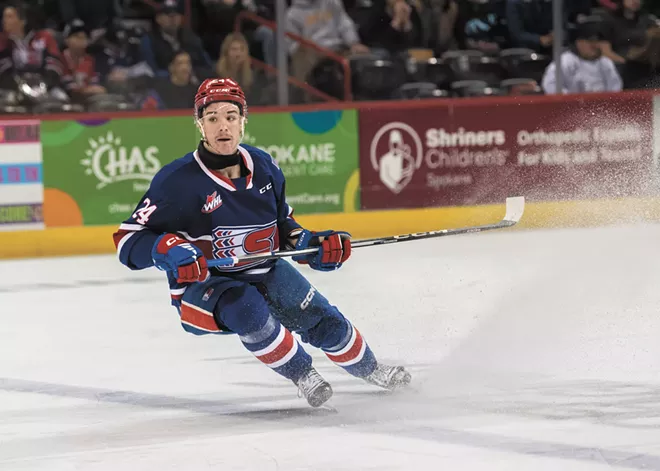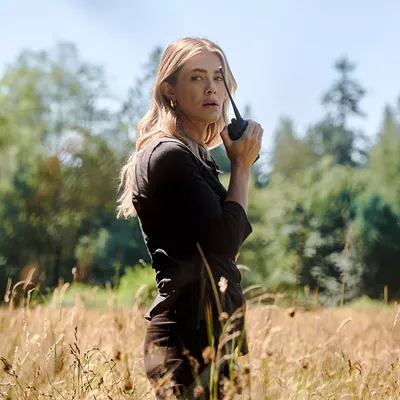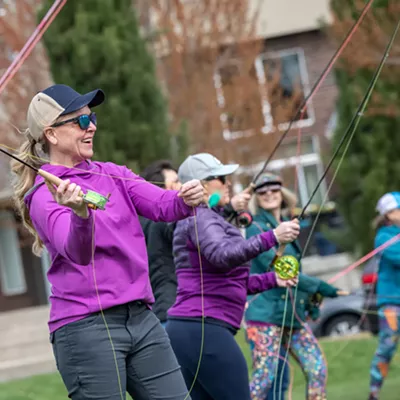Spokane Arena is abuzz any night the Spokane Chiefs take the ice. Fans decked out in blue and red fill the stands, the Zamboni completes its pre-game rituals, and nacho cheese and beer are flowing. Back in the locker room the players gather around for a motivational speech, ready to take the rink.
But how did they get here?
The Spokane Chiefs have become a pivotal part of the local sports scene since moving to town in 1985. Throughout the years since, the team has produced more than 60 National Hockey League players, yet not all fans may realize that many of those Chiefs are essentially just kids, or barely adults.
The Chiefs are part of the Western Hockey League, a major junior league under the Canadian Hockey League umbrella, which means players range from 15 to 20 years old. The program gives young players a chance to play high-level hockey and to be seen by professional leagues like the NHL.
That's certainly the case for Saige Weinstein. Now in his fourth year with the Chiefs, the 18-year-old is a native of Edmonton, Alberta, and has been skating since he was 4. He signed a three-year, entry-level contract with the NHL's Colorado Avalanche in October. This means he can't sign with any other teams during that period, but he's still a way from earning his spot on the roster.
The NHL has two lower-level leagues associated with it, the American Hockey League and the East Coast Hockey League. Players can be signed by a team like the Avalanche, and be loaned out to the lower teams. The NHL also has an agreement with the WHL, so Weinstein can continue to play in Spokane until he's 20.
"So I'm 18 years old now, I'm eligible to play in the [NHL]. But it's the NHL, it's a hard league to play in," Weinstein says.
Weinstein is a defenseman, but already has 37 points (seven goals and 30 assists) so far in his four years and 145 games with the Spokane Chiefs.
He grew up in an athletic household — both his older sister and twin sister are competitive soccer players. Weinstein attributes much of his success to the fact that all three played sports year-round, traveling for games and tournaments, and getting up early to get to practice.
"It's always been a competitive nature in the house. I used to play soccer as well," he says. "My dad got me into hockey when I was young, and in Edmonton it snows lots during the winter. So when I was younger I was always out at the outdoor rink because there's really nothing else to do in the winter in Edmonton."
Weinstein's teammate Conner Roulette was acquired this summer by the Chiefs from the Saskatoon Blades, and is in his first year with the team. He was drafted in 2021 to the Dallas Stars, and the 2023-24 season will be his last in the WHL before he ages out.
Roulette, 20, is from Winnipeg, Manitoba, and also started skating when he was around 4 years old.
"I got into hockey because it's my family thing. Growing up in Canada... there's really no other choice," Roulette says. "So everyone in my family — my older brother, my dad, my grandpas, uncles — they've all played hockey. So growing up as a kid, I aspired to be a hockey player, and that's how I got here."
Roulette plays left wing with the Chiefs. In his five years and 219 games in the WHL, he has 218 points (including 92 goals and 126 assists).
Youth hockey is a popular sport, and continues to grow. During the 2022-23 season, USA Hockey (the regulating body for much of youth hockey in the U.S.) had more than 387,000 registered youth players. USA Hockey's Canadian counterpart, Hockey Canada, had more than 443,000 youth players last season. Each year, only 224 players are drafted into the NHL and even fewer ever play there — each team is only allowed to carry 23 active players at any given time, and may not have more than 50 players under contract at any point during the season.
There are various levels of competition, and for talented athletes like Weinstein and Roulette, playing for a lower league is one of their best chances to be noticed by the NHL all while continuing to improve their skills.
And they're given plenty of opportunities to do so: This season, the Chiefs play 68 regular season games. The season kicked off Sept. 22 and wraps up on March 23.
These talented players aren't alone in their commitment to a high-level hockey career. The dream often requires equally serious support from family, whether ferrying them around to tournaments, rousing them from bed for 5 am practices, or paying for expensive gear.

Roulette's parents were deeply invested in helping their son achieve his hockey dreams.
"They're big hockey fans, too, so there was always hockey on at the house, and I was always able to watch hockey and be surrounded by it," he says.
Because Chiefs players are so young, they're housed with local families in the Spokane area, known as billet (or host) families. Weinstein and Roulette both feel lucky to have been assigned to their respective families when they first moved to town.
"We all can't really live on our own, and our families obviously don't move out with us," Roulette says. "It's great that people are willing to put in the hard work of being hockey parents. They cook for us, and they do everything they can to make sure we're living comfortably, and we do the best they can to make sure we're giving back to them."
There are many requirements to become a host family, including a dedicated room and bathroom for the player, daily meal provisions and preparation, and wifi access. Local families volunteer space in their homes to give players a welcoming experience while in Spokane. In addition to this housing setup, WHL players receive a monthly stipend and have all travel and equipment costs funded.
Weinstein says moving far from home at a young age can be really difficult on everyone involved, including a player's parents.
"It really helps when you have a really good billet family," he says. "I was lucky enough, my 16-year-old year, I got matched up with my billets, and they've been amazing. They're just family now, and I think I really got lucky there. There's lots of maturing that goes on when you first start billeting... and moving away from home is where you're going to get that. And it's definitely a good life skill."
Although Weinstein went undrafted in the last NHL draft, this year he was invited to the Colorado Avalanche's summer development camp.
"I was just going there to prove myself and obviously went there to give it my all," he says. "I played some good hockey when I was there, and I got lucky enough to get invited back to main camp with all the big names... basically the whole Avalanche team. To be on the ice with those guys was amazing. And I showed myself well — I showed what I did well and I got lucky enough to sign a contract."
Roulette recalls the day he was drafted by the Dallas Stars in 2021 as one of the best moments in his life so far.
"You play hockey at the high level you're at, eventually you get rewarded for it," he says. "I appreciated everything that Dallas has done for me, and it was just a really cool experience."
Both players are excited for what their futures hold, but know it'll take a lot more hard work to get there.
"I'm hoping to play pro as much as every other hockey player does," Roulette says. "Getting to the next level is obviously a big goal for me, and it's something that I'm working hard for."
Weinstein tries to focus on the present and the many opportunities before him.
"Practice every day, workouts every day — just trying to get better every day, and just focus on what I do well and what I'm not so good at," he says. "Getting better at those and just taking it day by day. But it's hard work. It's hard to make the NHL, but that's been a goal since I was young, and I'm going to keep working for it every day." ♦
Spokane Chiefs vs. Wenatchee Wild • Wed, Dec. 27 at 7:05 pm
Spokane Chiefs vs. Tri-City Americans • Sat, Dec. 30 at 6:05 pm
Tickets $17-$32 • Spokane Arena • 701 W. Mallon Ave. • More info at spokanechiefs.com
























